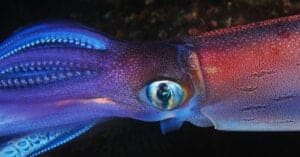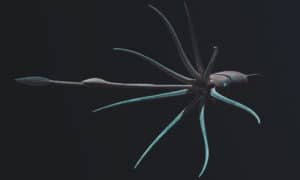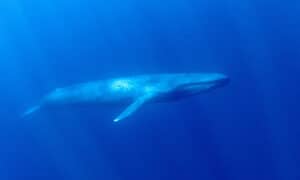For many people, the only time they think about squid is when they sit down for an Italian dinner. In stark contrast to how many humans view these sea creatures, research continues to show just how intelligent cephalopods are, squid included. Today, we will look at squid and try to understand just how “smart” they really are. After looking through this, it may be that some dietary changes are needed! Let’s get started and discover: How smart are squid?
Just How Smart Are Squid?
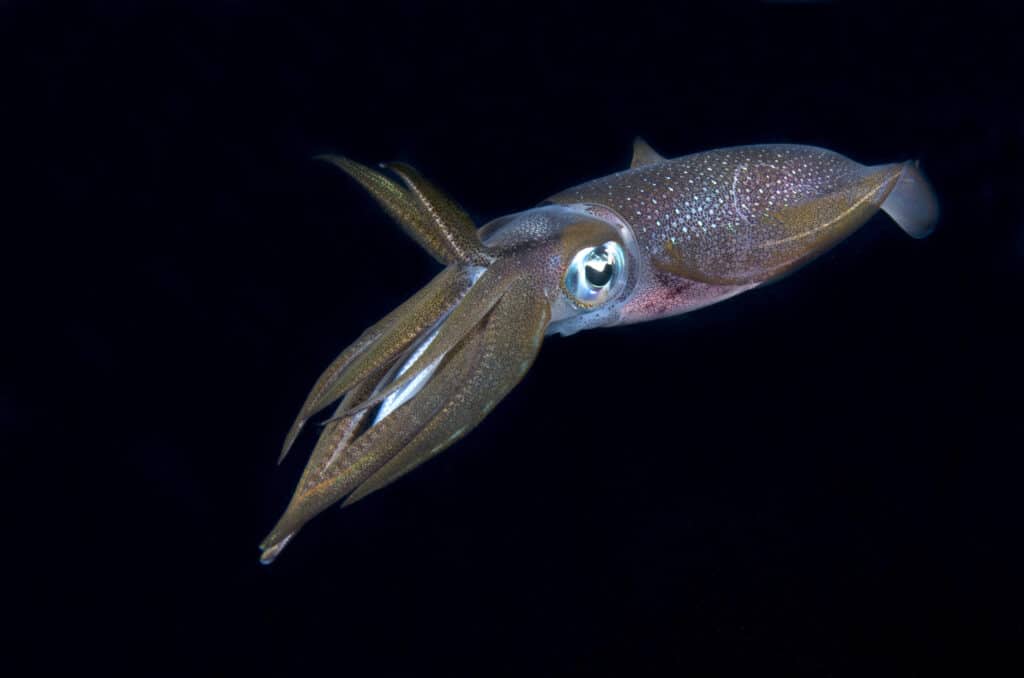
Cephalopods, squid included, are among the smartest creatures in the ocean, albeit in their own ways.
©iStock.com/DiveIvanov
Squid are among the most intelligent invertebrates in the world. Regardless of species, squid have brains that are highly developed, complex, and extremely unique when compared to humans. In lab scenarios and in the wild, they repeatedly show they can perform a variety of tasks that require heavy cognitive ability.
In these environments, they have shown a propensity for learning, memory, communication, and high-level problem-solving. With these skills, they adapt to different situations and environments in the wild. They also use their body and behavior to communicate with each other and hunt prey in unique ways.
Although the research isn’t complete, there have been some references to the intelligence of dogs. Some researchers even say that squid have some semblances of self-awareness, a key indicator for high levels of intelligence. Additionally, squid have shown signs of playfulness and curiosity when in captivity, recognizing humans and enjoying exploratory games. These are all signs of well-developed intelligence and cognitive capabilities.
Cognitive Capabilities: Understanding Squid’s Problem-Solving Skills and Learning Aptitude
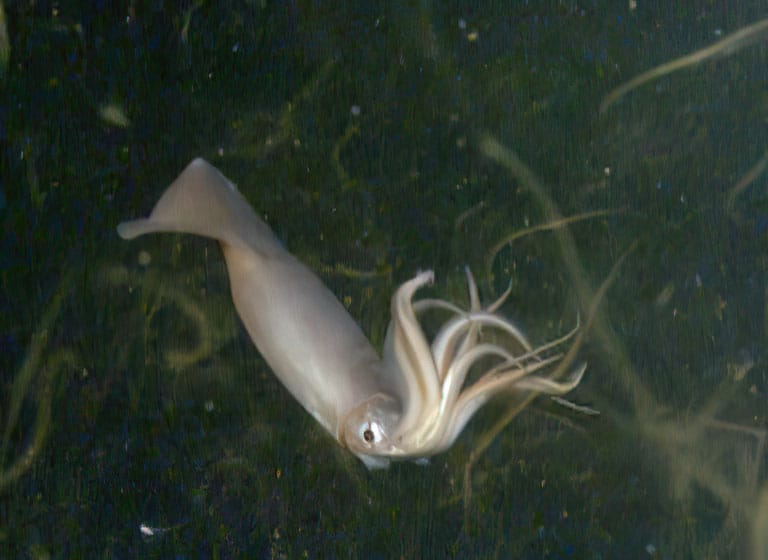
The Humbolt squid repeatedly displays levels of high intelligence through group hunting and communication, organized disruption of prey sources, and even self-gene-altering for survival.
©Image courtesy of NOAA/MBARI 2006 / public domain – License
A few things set squid apart in the animal kingdom: the ability to solve problems and the ability to learn from past experiences. When you combine the two, you get a creature that solves problems, learns from them, and then can solve more complex problems – that’s pretty smart!
Tool Use
Some squid can detach their own arms and use them as decoys to distract their attackers. Several steps show the intelligence they need for this action: assessment of the predator’s threat level, deciding when and how to detach their arms, and then the actual escape. Tool use usually refers to using a rock or something, but appendages count too!
Communication
Many species of squid can communicate with each other using complex patterns of color, shape, and texture on their skin. They can also use these signals to trick prey or predators, similar to how an octopus or chameleon can change its appearance according to the environment. For example, some squid can mimic the appearance of other animals, like fish or crabs, to lure or scare other animals. This requires the squid to have a good memory of the visual features of different animals, as well as the ability to control their skin cells precisely. In fact, a lot of the brain power that squids (and cephalopods in general) possess is located in the neurons of their skin!
Cooperation
Like dolphins, humans, and seals, squid can cooperate with each other to hunt in groups. During these hunting sessions, they coordinate their movements and can even synchronize their attacks using visual cues.
Squids have been seen forming circles around their prey, flashing red and white in unison to confuse and stun them, and then moving in for the kill. This requires the squid to have a sense of teamwork and strategy, as well as the ability to communicate, all things that a very smart animal should be able to do.
Memory and Human Interaction
Squid can recognize individual humans and show preferences for certain people. Almost like a puppy, they can also interact with humans in playful ways!
Intelligence in the Animal Kingdom: Comparing Squid to Other Species
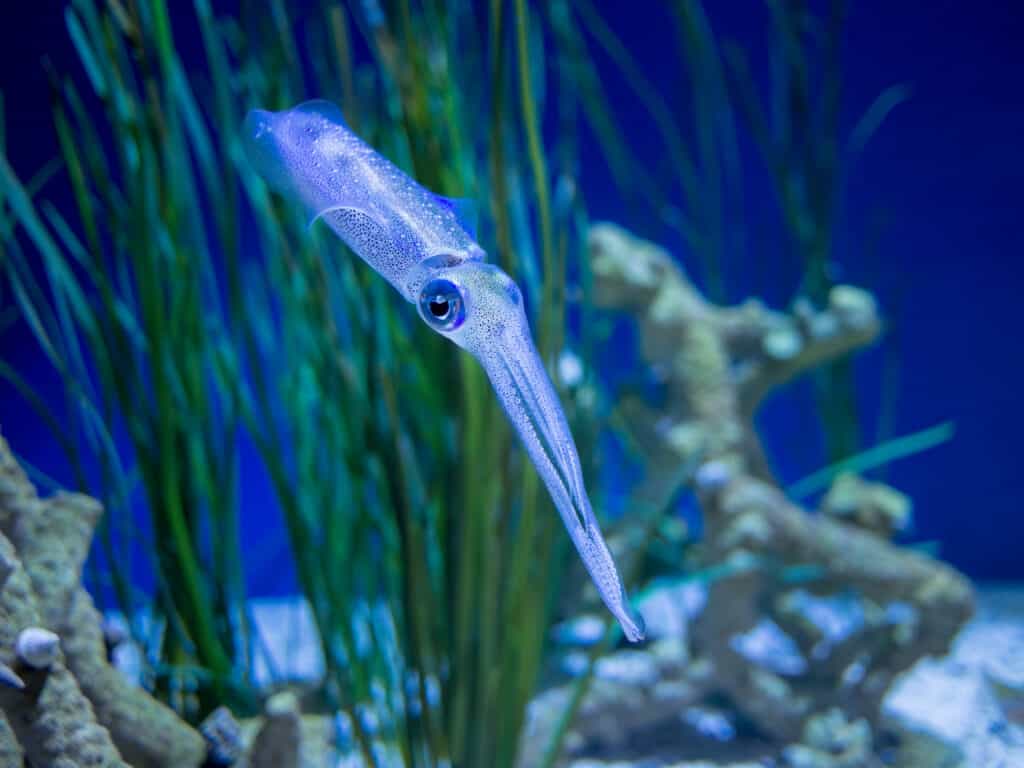
It’s hard to compare squid to mammals, especially in terms of concrete intelligence. However, squid have many cognitive capabilities that dogs, or even humans, couldn’t dream of!
©Rhododendrites, CC BY-SA 4.0 <https://creativecommons.org/licenses/by-sa/4.0>, via Wikimedia Commons – License
Squid are among the most intelligent invertebrates, but how do they compare to other animals? Here are some animals that humans are generally familiar with, especially when considering our familiarity with their intelligence:
Octopuses
Octopuses are generally considered to be the smartest cephalopods out there. They have a very high brain-to-body mass ratio, plus more overall neurons than squid. Generally speaking, higher brain-to-body ratios and pure number of neurons correlate to higher levels of intelligence. Octopuses also have a more centralized and organized brain structure. This is contrasted to squid, which has a more distributed brain with many neurons in their arms and tentacles (although octopuses ALSO have these decentralized neuron structures as well).
Dogs
Dogs are often compared to squid in terms of intelligence, especially since humans are very aware of dogs and how “smart” they are. Both animals can perform various tasks, but it’s important to know that dogs have a different brain structure and evolution from squid. This is mostly due to a different evolutionary path (they are vertebrates and mammals). A true comparison is tough, especially since we as humans don’t really have a great definition for what intelligence even is yet. Dogs were bred to be extremely adept at bonding and for human social awareness, something a squid could never match. At the same time, a dog could never intuitively mimic and camouflage to the level a squid can passively.
Birds
Although maybe the most different from squid, birds are another group of animals that have evolved remarkable intelligence independently. Still, we again run into similar comparison issues as with the dog. Birds have a different brain structure from squid, generally having a smaller but denser brain with more neurons per volume. Due to their different lifestyles, birds may have an advantage over squid in some aspects of intelligence, namely spatial navigation, vocal learning, and even numerical cognition (understanding numbers and quantities). Some birds, such as the grey macaw, can even mimic human speech and understand concepts like colors, shapes, and numbers. Which one is smarter? Well, it isn’t super clear. They just have different intelligences suited for their environments.
Past Discoveries and Studies on Squid’s Intelligence
Squid’s intelligence has been a subject of scientific interest and curiosity for decades. In fact, research into these areas allows humans to learn more about all sorts of animals and even help create new distinctions for what counts as “intelligence.” Here are some of the studies and results that have come from science regarding squid:
- Squid can edit their own genetic instructions: A study in 2017 found that squid can alter their RNA (the messenger for DNA) to change their gene expression and adapt to different situations.
- Squid can communicate with complex signals: Squid can use their skin coloration, texture, shape, and posture to convey information to each other and to their prey. Squid can also mimic the appearance of other animals or objects to lure or scare their prey. These signals require the squid to have a good memory and control of their skin cells.
- Squid can cooperate to hunt in groups: Squid can work together to capture their prey using visual cues and coordination. For example, some squid can form a circle around their prey and flash their lights in unison to confuse and stun them.
- Squid can recognize and interact with humans: Squid can distinguish between individual humans and even show personal preferences towards humans they “like” more than others!
The photo featured at the top of this post is © iStock.com/MichaelStubblefield
Thank you for reading! Have some feedback for us? Contact the AZ Animals editorial team.



